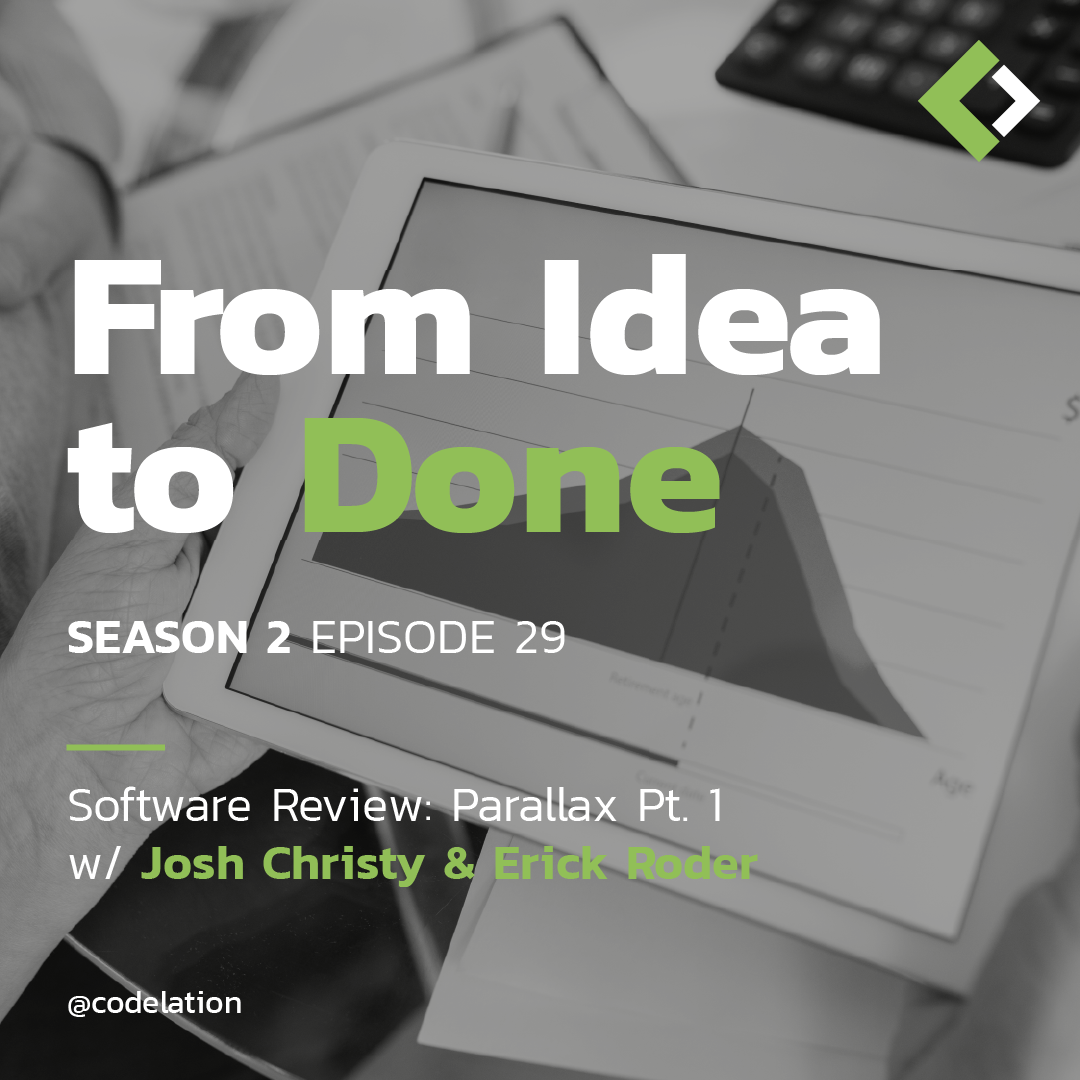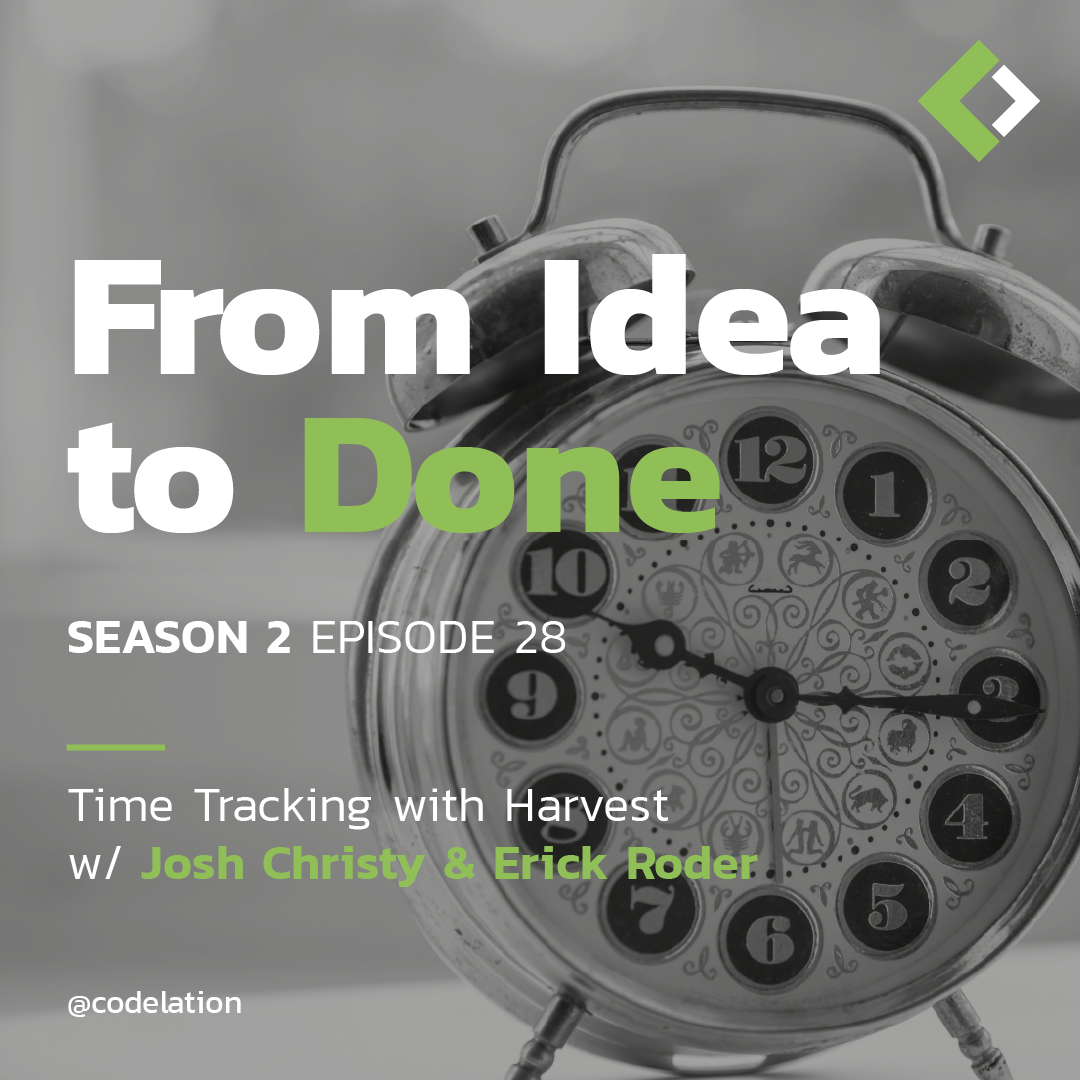Software Review: Harvest
Company Culture and Engineering ft. Jake Joraanstad
July 7, 2020
Software Review: Parallax Pt. 1
July 21, 2020VO: Get ready for your semi-regular dose of random ideas from the guys at Codelation. We like to talk about big ideas companies that are winning, and those that aren't along with current events in our crazy world of software startups. So come along with Erick and Josh, who challenge you to think big, start small and turn your ideas into something on this episode of, from idea to done.
Josh: Hey everyone, I'm Josh.
Erick: and I'm Erick and today's idea is time-tracking with robots or software, you know, same kind of things, but we're going to chat a little bit about this new software that we're using in our office to kind of track our time. And it's called harvest. Josh, can you give us a little breakdown of what harvest does?
Josh: Yeah, It's, it's new to us. And although at the same time we used to use harvest a few years back, but it does, you know, just what you said, it tracks time. Um, it helps us know where we're spending our time and how profitable or not a project is. And you know, the interesting thing I just learned about harvest is that they've been around for about 14 years. They started in 2006 and they've only taken one funding round.
Erick: I that's kind of impressive for an app and we should maybe learn from them on boring, old timecard, different app. I'm willing to, it's interesting. Cause like timecards were like, this is what you're paid for, but what are you actually doing? And I think one of the big takeaways from this is we should be tracking what we're doing every day and not just on billable projects and tracking time as a way to kind of see where, where there's some holes and some gaps in our team. And we started tracking time. Like, I don't know about it this time, last year. And we found out that both of us kind of spend a lot of time producing podcasts and that we didn't post consistently. And we, it was not like it was a ton of time. I was like 10 hours a week. So we kind of said, oh, why don't we bring in an intern to help us with consistently posting and then editing this. And then it led us to Maddie who I'm super happy that we have. And so shout out to you for editing and listening to us right now. But I want to look at that before. Cause it's non-billable and I think that it was super important to find what we were doing outside of billable projects.
Josh: Yeah. That's something that's really easy to overlook, you know, where you're spending your time. I feel like, uh, you know, at the end of the week, I'm completely wiped out some weeks. And if I really look back at what I've been working on, it's typically things that, you know, don't give me energy. They're they're tasks. They're not focused on growing the business, it's working in the business. And, um, that doesn't make sense for me to be doing.
Erick: And like when I did it, one of the other things I found was just kind of like looking at how much time I was spending, who do you want to go have a meeting and like writing emails. And from there we found a little scheduling, um, tool in our CRM helped me just kind of automate that system and it saved me two to five hours of week. And so have you found anything interesting when you've been tracking your hours?
Josh: Yeah, I'll go back to, well, just, you know, talking about it, it opened my eyes when I'm working on tasks that I could outsource or really, you know, hand off to someone else. You know, so basically for me, it's the concept of, I need to stop doing $10 an hour work and start doing a hundred dollars
Erick: An hour and everyone should do a hundred or worse. And I think it's also kind of important from your seat or even if you have like a manager to see what everyone else is spending their time on during the week. And so would you recommend other owners using harvest
Josh: Harvest or some other time tracking solution? I remember, uh, one of my gigs I worked before this job was, um, they, they had us track everything in 15 minute increments with a note and you couldn't get paid until you submitted that, like just completely over the top and the, the point of time tracking isn't so that we can tell people to work more or be quicker it's so that we know where we're spending our dollars as a company.
Erick: Yes. And I think that that's super important just to see where again, some of your deficiencies are and where you can be, where you should be hiring, even if there's something that someone's working too hard. And so, yeah, I think it's great just to have a stopwatch, to see how much time I'm spending, taking people to coffee or going to networking events or just even working on marketing stuff or anything else, I guess, et cetera. I would recommend this to anyone who's in a sales position. And so do you have any final thoughts on it, Josh? Yeah,
Josh: Uh, really, you know, it helps point out things you're talking about and you know, for my seat, it's even something as simple as let's switch all the clients over to an electronic pay versus the two hours a week, I take a $400 check to the bank. Like it just, it makes no sense for some of that stuff. So, you know, just learn where you're spending your time. It really helps you plan better for future needs. Perfect.
Erick: Well, thank you everyone for listening, we are hoping, you know, of a startup that could use our advice and random thoughts. Send them over to correlation.com to hear about our next podcast.
Sign up to receive email updates
Enter your name and email address below and I'll send you periodic updates about the podcast.
